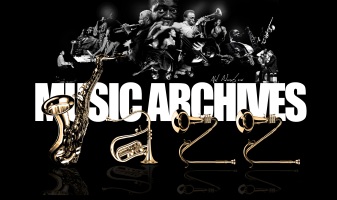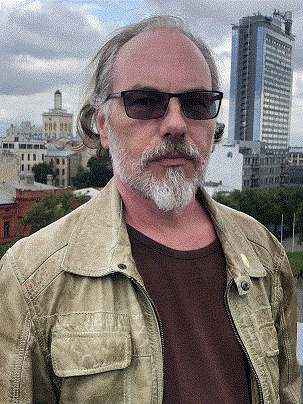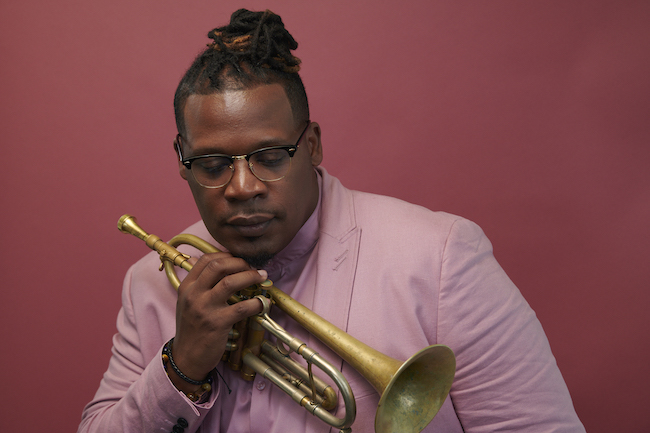
 |
Keyon Harrold: Real Life |
Post Reply 
|
| Author | |
snobb 
Forum Admin Group 

Site Admin Joined: 22 Dec 2010 Location: Vilnius Status: Offline Points: 28830 |
 Post Options Post Options
 Thanks(0) Thanks(0)
 Quote Quote  Reply Reply
 Topic: Keyon Harrold: Real Life Topic: Keyon Harrold: Real LifePosted: 22 Feb 2024 at 7:03am |
 “I’m a father, mentor, teacher, bandleader and activist,” says Keyon Harrold. “All of these things are happening at once. We all need some kind of barometer to help us stay grounded.” (Photo: Kwafu Alston)Inside trumpeter, singer and composer Keyon Harrold’s workroom hang three call-to-action signposts: execution, hustle and grind. Collectively, he calls them “the Keyon Experience.” He says those visual mental notes are scattered throughout his Los Angeles home to remind him to stay humble and remain willing to grow, personally and professionally. “We have so many things going on in our lives,” the Grammy-winning Harrold said via Zoom in late November of last year. “I’ve got real life happening. I’m a father, mentor, teacher, bandleader and activist. All of these things are happening at once. We all need some kind of barometer to help us stay grounded.” Much of that grounding anchors Harrold’s newest album, Foreverland (Concord Jazz), the long-awaited follow-up to his 2017 album, The Mugician. Just as he alluded to “real life happening” for him personally, quite a few historic, worldwide flashpoints also occurred within those five years. The world experienced a worldwide pandemic beginning in March 2020; just two months after the pandemic began, the world erupted with Black Lives Matter protests in the aftermath of George Floyd’s death at the hands of Minneapolis police; the U.S. government experienced a contentious presidential election, which led to the defeat of former U.S. president Donald Trump. The following year began with the Jan. 6 riot on the U.S. Capitol, spurred by U.S. presidential election result deniers and later Russia invaded the Ukraine. In 2023, a new violent conflict between Hamas-led Palestinians and Israel ignited on the Gaza Strip. With all those weighty events and more serving as backdrop, Foreverland sounds like a musical balm. Harrold’s iridescent trumpet tone and elegiac melodicism careen over a program of hybrid jazz hip-hop and modern soul in a mostly unhurried fashion. Often, the album recalls Stevie Wonder’s mid-’70s classic LP Fulfillingness’ First Finale, which contemplated on sociopolitical themes, religiosity and affairs of the heart, so gently at times, that the biting messages of some songs eluded listeners if they weren’t paying close attention. Foreverland opens with the meditative “Peace Of Mind,” on which Harrold’s soothing tenor croons, “Gonna try to find that peace of mind/Can’t control things outside/Own your peace inside/Situations are going to test you/Feel light,” amid a celestial soundscape of swirling electronic textures and Robert Glasper’s plaintive piano accompaniment. Soon after, Common enters with introspective rhymes as the rhythm section pushes the song forward with a lumbering hip-hop beat. As the song progresses, Harrold’s melodic lines on trumpet soar across the arrangement like an eagle gliding over the horizon. “Peace Of Mind” becomes Foreverland’s guiding light as the album continues with “Beautiful Day,” perhaps the album’s most pronounced nod to Stevie Wonder. This time, PJ Morton handles lead vocals as well as the keyboard’s thick, rubbery bounce as he sings, “Look at the sun shining/Why don’t you like the sunlight line?” atop a medium-tempo groove. It’s the kind of song that one sings after recovering from heartache. The album’s pulse picks up on “The Intellectual,” a moody instrumental on which Harrold’s mellifluous lines navigate Chris Dave’s jagged drum beats, Burniss Travis’ sensuous bass lines and Shedrick Mitchell’s graceful piano accompaniment. The suspenseful “Gotta Go (Outer Space)” is another instrumental gem that this time features cinematic keyboard work from BIGYUKI and torrential drumming from Marcus Gilmore. In addition to the aforementioned, Foreverland also features other noteworthy guests like guitarist Nir Felder, keyboardist Greg Phillinganes and singers Jean Baylor and Laura Mvula. Harrold conceived of the album in 2021 while celebrating his 41st birthday in Las Vegas. A year prior, Harrold’s then 14-year-old son was racially profiled inside the lobby of Arlo, a New York City boutique hotel. A white woman falsely accused his teenage son of stealing her smartphone. Harrold captured the harrowing incident on his phone. That video went viral in a year when racial tensions in the U.S. had already reached a feverish peak. Growing up in Ferguson, Missouri — a St. Louis suburb that caught fire after Michael Brown was gunned down by the police in 2014 — Harrold had already witnessed how brutal racism can unfold when it comes to Black America. Sadly, the incident involving his son was all too familiar. “My job as a parent is to teach my son that at any given time, that he could face what I’ve already seen while I was growing up,” Harrold says. “It just so happens that at the age of 14 he was being judged not by his character but what he looked like. That’s so unfortunate, but at the same time, I think it’s one of the biggest learning lessons he could have. At a certain point as a parent, you have to let your child go and hopefully they will be able to stand on their own two feet, be able to understand what is happening and be able to survive.” Besides Ferguson’s long simmering racial tension, Harrold does have fond memories of growing up there. He mentions the great musical legacy of St. Louis — Miles Davis, Shorty Baker, Fontella Bass and Donny Hathaway, to name a few of the city’s heroes. Harrold also gives his own family a major shoutout for his musical upbringing, particularly his grandfather, a police officer who led the Memorial Lances Drum and Bugle Corps. “He taught people how to play music for free,” Harrold says of his grandfather. “That’s how I learned how to play the trumpet.” After high school, Harrold arrived in New York in 1999 to attend the New School University and study music. There he met some illustrious contemporaries including Glasper, saxophonist Marcus Strickland and singer Bilal. When Common was assembling a touring band to support his 2000 hip-hop classic Like Water For Chocolate, Harrold played trumpet. Since then, he’s worked with a litany of jazz, hip-hop and soul stars that include Gregory Porter, Beyoncé, Erykah Badu and Jay-Z. After 23 years of living in New York, Harrold relocated to Los Angeles, in part, to continue his exploration into film scoring. He’d already supplied the trumpet lines for Don Cheadle’s portrayal of Miles Davis in the 2015 biopic Miles Ahead and worked with Glasper on the TV series Winning Time: The Rise of the Lakers Dynasty. “I moved to Los Angeles to try something different,” Harrold says. “I want to do more film scoring. Being in Los Angeles makes doing that more accessible. Every now and then, you got to change it up so that you can create some new vibes.” DB |
|
 |
|
Post Reply 
|
|
|
Tweet
|
| Forum Jump | Forum Permissions  You cannot post new topics in this forum You cannot reply to topics in this forum You cannot delete your posts in this forum You cannot edit your posts in this forum You cannot create polls in this forum You cannot vote in polls in this forum |